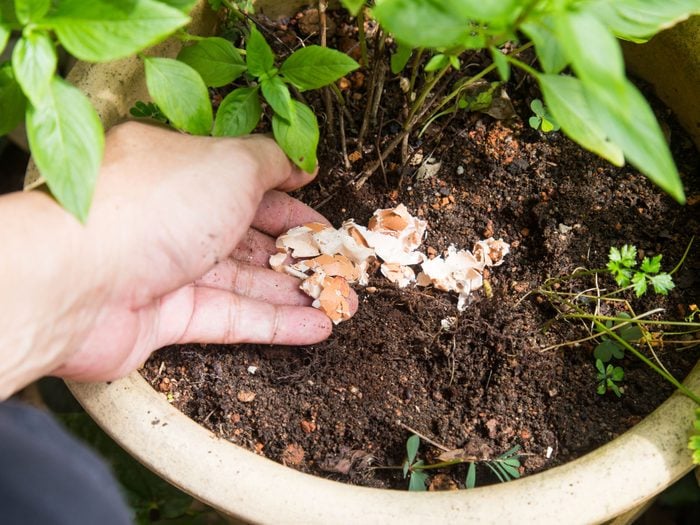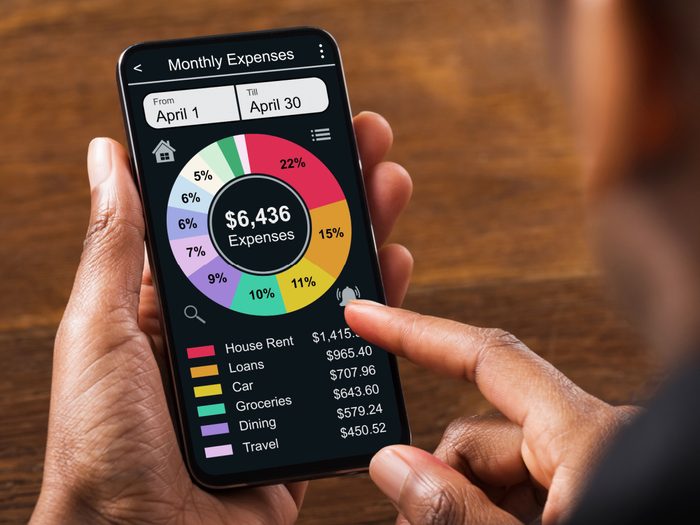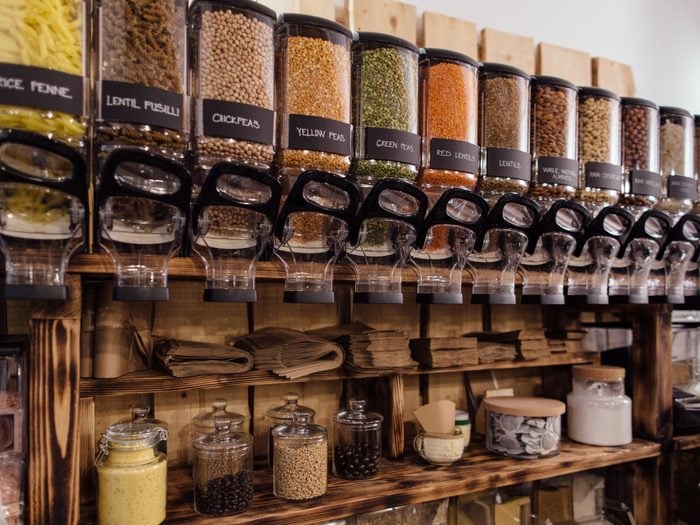
Switch to a Credit Union
Consider a credit union instead of a bank, as they often have lower fees—as much as 25 per cent lower in some cases—and better interest rates. They’re also member-owned and not-for-profit. Check different credit unions to see what other perks they offer.

Save Your Scraps
Instead of tossing your food scraps, get creative. Eggshells can be used to fertilize your garden or mellow out too-bitter coffee. Veggie scraps can make a delicious broth, and fruit scraps can be used to make a zingy vinegar. Next time, try an online recipe search before resorting to the bin!
Find out more dollar store solutions for life’s little dilemmas.

Make Your Own Cleaning Products
Forget the expensive store-bought stuff and try mixing one part distilled white vinegar with two parts water and a splash of lemon. This homemade all-purpose cleaner is good for the kitchen, bathroom and most floors. Vinegar and cornstarch works for windows, and vinegar and baking soda is great for soap scum.

Plan Ahead and Drive Less
Whether you own your own car or use a car-sharing service, you still need to pay for ever-pricier fuel. Map out your route ahead of time and combine errands to make each trip more cost-effective. If you can buy gas every 10 days instead of once a week, you’ll fill up approximately 16 times less over the course of a year.
Find out if there’s any truth to the claim that driving without AC saves gas.

Grocery Shop on Wednesdays
Weekly specials usually start mid-week, which means you’ll get first dibs before anything sells out. But it’s also when the shelves are freshly stocked—meaning it’s also when a lot of the previous week’s items are reduced for quick sale before their best-by date.
You can also stretch your grocery budget by learning how to choose the freshest produce.

Take Advantage of Tax Rebates
Tax credits and deductions are the pinnacle of money saving tips, but only if you know about them. Familiarize yourself with tax credits and deductions that could result in a larger refund, such as those for charitable donations, digital news subscriptions and moving expenses.

Ask for Unbaked Goods at Costco
Some Costco stores in Canada will let you buy a box of frozen, uncooked Kirkland Signature cookies. You can typically get 120 cookies for under $30, compared to about $10 for a dozen baked ones. Call your local store to check before testing out this tastiest of all money saving tips.

Ditch Your Car
Sometimes the best car is no car. Cut maintenance and insurance fees out of your budget by using a car-sharing option like Zipcar or Enterprise CarShare. Fees typically run up to $14 per hour or about $105 for the day.

Get Creative With Day-Old Bread
Many bakeries will sell their stale bread at a deep discount. It’s perfect for French toast, bread pudding, croutons and bread crumbs. Making the latter ahead means you’ll save yourself some time in the process! You can also try this genius hack to revive stale bread.

Schedule Potlucks
Share food, laughter and sunshine at a backyard potluck or outdoor picnic lunch. Not only will you get a chance to impress everyone with a new twist on grandma’s classic potato-salad recipe, but making—and sharing—one big dish is cheaper than dining out. Invest in some reusable dishes from the dollar store to keep it low waste and even more budget-friendly.

Buy Pet Food in Bulk
Bulk food stores have long aisles of candy, spices, baking supplies and snacks—but did you know they also carry pet food? Bring in a refillable container and buy your pet’s favourite food by weight instead of by the bag to save some cash.
Find out the money mistakes that are costing you thousands.

Buy Meat in Bulk
If you can afford the upfront cost, you may be able to save big by purchasing larger quantities of meat from a local butcher or a bulk grocery store and freezing it for later use. Also, ask your butcher to suggest less expensive alternatives to your favourite cuts—like a Denver steak instead of a rib-eye.

Track Your Budget With an App
If you’re struggling to follow a budget or just want to see your spending at a glance, consider an app. Mint, YNAB (You Need a Budget) and Simplifi are all highly rated by users for their features and ease of use. Each app will help you track your income, spending, savings goals and more. Couples can also try Honeydue and Goodbudget to share an overall view of their finances.

Zap Your Browser History
The ads you see online are geared toward your browser activity—which is why it might feel like that dress you’ve been eyeing is following you from site to site. This can make it tempting to spend. To avoid these personalized promos, delete your history and cookies throughout the week—or use a private browsing tab (called going “incognito” if you’re a Chrome user) when looking at e-commerce sites.

Mind Your Emergency Fund
You can mitigate the impact of unexpected expenses by putting a small amount of money into an emergency fund each month. Talk to your bank about high-interest online savings accounts, which are typically free and also tend to offer higher rates compared to a regular savings account, making them perfect for rainy-day saving.

Skip the Big Brands

Redecorate With “Oops” Paint
If you want to freshen up your walls or even your cupboards, ask your local home-supply store if they have any “oops” paint for sale. This is a casual term for paint that was custom-mixed and rejected or returned by a customer. It’s hugely discounted (sometimes just $10 a gallon!) and a great deal if you can find a colour you like.
Discover more budget-friendly ways to boost your home’s curb appeal.

Price Match
Here’s one of the tried-and-true money saving tips: Try price matching with paper flyers at the register. You can also save money by price matching larger items, like electronics and appliances. Some retailers—such as Home Depot—will even beat their competitors’ advertised price by 10 per cent.

Plan Meals Around the Flyer
“Shop from the front page of the flyer,” advises Janet Gray, a certified financial planner and consultant with Money Coaches Canada. Plan meals around whatever deals are offered instead of buying the same products each week—it might even lead you to some new favourites.
Check out this seven-day meal plan that starts with a big batch of rice.

Cancel Subscriptions
During the pandemic, subscribing to multiple streaming services was a necessary way to pass the time. Then the bills came in: nearly $50 a month if you have Netflix, Crave and Disney+. Cancel anything you haven’t used in three months or, if you can’t decide, the one that comes with the highest price tag. Also get rid of any club or fitness memberships you aren’t using, as well as entertainment packages like satellite radio.

Haggle Down Your Telecom Bill
If your monthly telephone, cable and Internet bills are higher than you’d like (and they probably are!), call your service provider to ask about deals and promotions. Even if no promotions are being advertised, providers may be willing to reduce your monthly fee or offer credit. Reps often have a limited number of credits to give customers in a given shift, so the early bird gets the worm (or the better deal, in this case).
If you’re enjoying these money saving tips, you’ll want to learn how to haggle like a pro.

Use Cash
Cut back on overspending by saying goodbye to plastic and making cash your friend. “I started paying cash for everything while tackling some debt—seeing your money disappear makes you spend more conservatively,” says Caitlin, a copywriter and mother of two who lives in Toronto. “It forced us to shop sales, compare prices and plan our meals.”
Make sure you never use a debit card when making these purchases.

Always Empty Your Fridge
Caitlin also challenged herself and her family to empty the fridge before bringing in more food. That means keeping track of what’s already there, eating leftovers, coming up with creative recipes for leftover produce and not buying new condiments (i.e., finish one bottle of salad dressing before buying another). It’s made for almost zero food waste and approximately $50 each week in savings—that’s around $2,500 a year.
Find out eight grocery store secrets that’ll change the way you shop.

Do a Clothing Swap
What’s old is new again! Look for a local community swap meet on Facebook or on the announcements board at your library. If you can’t find one, arrange an informal meetup with friends. You can also organize an accessories swap, a book swap or similar events.

Grow a Vegetable Garden
Start from seeds to maximize your savings. They’re usually no more than a couple bucks, and you can economize even more by learning to harvest your seeds for future seasons. If you don’t have a backyard, use pots or raised planters. Some regions also have community gardens where residents can access a garden plot in a public space (sometimes even for free).
These great gardening tips can help you get started.

Use Online Coupon Finders
Consider installing a browser extension like Honey to automatically apply coupons and save you money when you shop online. You can also use Rakuten to earn cash back. There are more deals out there than you may realize!
Follow these safe online shopping tips to protect your personal information.

Keep a Minimum Balance
Kathy, a retired teacher in Burlington, Ontario, saves $360 a year by keeping a minimum balance in her account. Many financial institutions will cover the cost of your monthly or annual fees if you keep your account balance above a certain amount—commonly between $3,000 and $5,000.

Exploit Credit Card Points
Many credit cards offer cash back or rewards points that can be redeemed for some of the essentials that are eating up your budget, like gas or groceries. Look into credit card options with no annual fee or a low, manageable fee that’s worth the payback in points.
Check out more expert advice on how to save money in Canada.

Host a Movie Night
Instead of going to the movies, gather around your at-home big screen or split the cost of a projector rental (prices typically start at around $130) and play your favourite flick in the backyard using a streaming service or DVD. To keep it low cost, BYO snacks!

Sell Unused Items
Try Facebook Marketplace, Kijiji or similar sites. You may end up getting rid of that air fryer that just sits there or the dress shoes you haven’t worn in years. This type of purge-and-sell approach may create enough cash inflow to cover the cost of a one-off expense, like a birthday gift or a night out.
Find out how to protect yourself from Facebook Marketplace scams.

Pan for Free Gold
Look for Freecycle groups on Facebook, where users give away unwanted items—everything from furniture to clothes, decor and even plants. It’s also a great way to declutter your house.

Beware of “Shrinkflation”
Watch out for packaged items that have shrunk in quantity while remaining at the same sticker price. That box of cereal you love may still be $5.99, but if it’s been reduced by 10 or even 20 per cent in volume, you’re paying more. Known as shrinkflation, this is a sneaky way to overcharge consumers for anything from packaged beverages and foods to cleaning supplies and toiletries. Pay attention to the price per pound, litre or 100 grams for the best possible deal. This may mean buying in bulk or switching to a comparable product from a discount brand.

Split Groceries With Friends and Family
If you have a small family or live alone, buying in bulk can still help you save. Plan your shopping trips with a friend or two and divide up those huge bags of oranges, sweet potatoes, snack foods and household goods.
Find out which items you should never buy in bulk.

Shop in Pairs
Many retailers place restrictions on “loss leaders”—heavily discounted items meant to attract new customers. To get around “one per shopper,” bring a partner and cash out separately.
Find out the best shopping apps to save money on groceries.

Try Bartering
Make arrangements with friends, family members or neighbours who could benefit from your skills while offering their own. Don’t be shy! If your neighbour is a mechanic and you’re a fantastic gardener, ask if you can clean up their yard and flower beds in exchange for a tune-up.

Repair Instead of Buy
Whether it’s a damaged phone or a broken zipper on your favourite winter jacket, consider repairing an item instead of replacing it. Learning just a few simple sewing fixes—using a small kit from the dollar store—can considerably prolong the life of your clothes.
Here’s more advice on how to buy less and still feel like you have enough.

Get a Free Parks Pass
If you like hiking but can’t afford the entrance fee at your favourite conservation area, check with your local library—it’s common for branches to have an entrance pass you can borrow for free. They may also lend out passes to other local attractions.
Discover the 10 national parks every Canadian needs to visit.

Borrow Your Tools
When you need a tool for a one-time repair, try to borrow the item instead of buying it. Ask friends and neighbours if they have what you need, or check out one of the many non-profit tool libraries across Canada, from Toronto to Vancouver. Many offer cheap annual memberships. Plus you won’t need to find space to store that power drill!
You can tackle these quick home repairs in 10 minutes or less.

Apply for Partial Drug Coverage
You may qualify for partial prescription medication coverage from your provincial government. In Ontario, for example, seniors aged 65 and over qualify for support under the Ontario Drug Benefit (ODB) program. Your pharmacist has the details.

Find Cheap Admission Days
Many local art galleries and museums offer free or reduced admission on certain days. If you’re a senior, it pays to make a list of attractions that discount admission throughout the week. Plus, if you’re new to Canada, you get free admission to over 1,400 attractions by using the Canoo app.
Here are 20 mind-blowing artefacts you’ll find in Canadian museums.

Kick the Can Down the Road
You may have to replace a decades-old roof, but do you really need a new TV? If a potential purchase is due to a case of “keeping up with the Joneses,” rather than necessity, kick that can.
These mindful shopping tips can help curb impulse spending.

Try Free Fitness
Many cities offer free outdoor fitness classes on the weekends. You may be able to try a yoga class, enjoy tai chi in the park or even get some cardio in with a running club. Start by checking your city’s municipal website for public schedules.
You can also tackle your workout from home: these common household items are fitness equipment in disguise.

Access Free Financial Advice
Gray recommends contacting Credit Counselling Canada if you’re struggling to manage debt and need personalized advice. Because they’re a not-for-profit organization, this service is provided at no or low cost. They offer in-person and virtual sessions, and their website also features a self-assessment tool and live chat where you can ask questions.

Slash Energy Bills
Channel your inner dad and remind yourself to shut off the lights when you leave the room. Also, unplug small appliances that aren’t in use, run the dishwasher and laundry machine during non-peak hours and keep your air conditioning set to 26 C, which is considered the perfect money-saving temperature for balmy summer months. The earth will thank you (and so will your wallet).
Find out more energy conservation tricks that translate into big savings.

Party at a Community Festival
Check your local parks and rec website to learn about free outdoor concerts, movie nights in the park or perhaps a cultural festival, then load up your calendar with family-friendly fun. Plan ahead and pack a small cooler to avoid overspending on food and drinks!

Use Apps to Find Cheap Gas
Download GasBuddy, Gas Guru or Waze to help find the best price on fuel throughout the day, with each app giving frequent price updates. You may also want to get a points card for each local gas station—you could collect points for perks, like cash back or other budget-friendly rewards.

Exploit Your Library
Yes, your local library has thousands of books. But many also provide free computer access, a play space for children, author events, concerts and more. Ask your librarian for guidance and a calendar of events, then make the most of it!
Here’s why Canada’s inflation rate is so high right now (and when it might come back down).

Fly for Cheap
Before booking a trip, check Google Flights to identify potential flights. Then select “track prices” and wait. You’ll get an email alert whenever the price goes up or down. Just plan ahead and be patient—it can take a few weeks of price monitoring before you see a number you like.
Here’s what you need to know before booking on a budget airline.

Buy Off-Season
When a season wraps, take stock of your needs for next year. Summer’s end is the time to buy warm-weather clothing and shoes, as well as BBQs, patio furniture and camping gear. Similarly, buy new holiday decor when everything is on clearance in the days following the celebration.
You’ll learn more great money saving tips by adding these popular finance podcasts to your playlist.